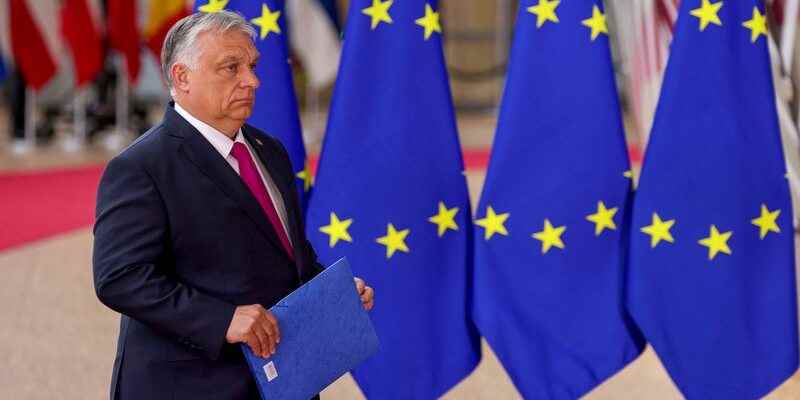BRUSSELS (Reuters) – The standoff between the European Union and Hungary continued on Friday, with Budapest demanding the release of billions of euros from the European recovery plan while Brussels demands reforms and the lifting of the government’s veto Hungarians to aid for Ukraine and minimum taxation of multinationals.
The European Commission still considers that Budapest’s recent anti-corruption efforts have not addressed all of its concerns about respect for the rule of law in Hungary, and therefore do not justify the release of some 13 .3 billion euros in aid that the country can claim.
The European executive has however opened the door to a partial release of this sum by the 26 other Member States to encourage the Hungarian government to continue its reforms.
Prime Minister Viktor Orban badly needs these European funds as inflation is expected to reach 26% this month, debt interest rates rise sharply and the economy is set to suffer a severe recession next year. next.
The EU has so far been inflexible, demanding substantial progress in the fight against corruption and the independence of the judiciary, demands to which Budapest retaliated by blocking €18 billion in aid to the Ukraine and the adoption by the Twenty-Seven of the minimum taxation of multinationals.
“I note the efforts made so far by Hungary”, writes the European Commissioner for the Budget, Johannes Hahn, in a letter consulted by Reuters, but “the overall risk for the budget of the Union (…) n has not changed in the light of the latest legislative changes adopted in Hungary”.
To increase the pressure on Brussels, Viktor Orban could oppose the approval of a new set of sanctions against Russia, expected later on Friday evening, fear diplomats.
As a sign of appeasement, the 26 other states could therefore conditionally approve the aid plan presented by Budapest, for an amount of 5.8 billion euros, and maintain the freezing of an additional 7.5 billion euros. , said sources familiar with the negotiations.
Discussions on this subject are not expected to take place before Monday, however, and, according to these sources, their outcome will also depend on Hungary’s willingness to lift the vetoes it has posed. There is therefore no guarantee that the crisis will be resolved by the summit of the Heads of State and Government of the Twenty-Seven next Thursday and Friday.
(Reporting by Gabriela Baczynska and John Chalmers, with Sabine Siebold and Jan Lopatka; French version Tangi Salaün, editing by Kate Entringer)
